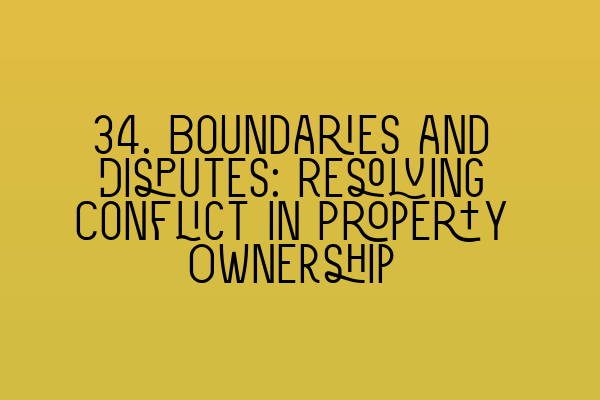34. Boundaries and Disputes: Resolving Conflict in Property Ownership
As a property owner or investor, it is essential to have a clear understanding of your rights and responsibilities regarding boundaries. Boundaries define the limits of your property, and disputes over them can lead to significant conflicts and legal complications. In this blog post, we will explore the common issues surrounding boundaries and provide valuable insights on resolving conflicts in property ownership.
Understanding Boundaries
Boundaries are lines or markers that define the extent of a property. They can be physical structures like fences, walls, or hedges, or they can be imaginary lines demarcating the separation between two properties. Boundary issues can arise due to various reasons, including property development, changes in land use, misinterpretation of boundary plans, or alterations made without consent.
Legal Aspects of Boundaries
When conflicts arise over boundaries, it becomes crucial to understand the legal aspects governing property ownership. The starting point is to refer to the title deeds and plans, which should ideally provide a clear representation of the boundaries. However, the actual physical position of the boundaries may differ from what is stated in the documents. This is where surveyors and boundary experts come into play.
Resolving Boundary Disputes
The resolution of boundary disputes often involves a combination of legal expertise, negotiation skills, and surveying techniques. Here are the key steps to resolving such disputes:
1. Consultation with Legal Professionals: Seek advice from property law solicitors who specialize in boundary disputes. They will carefully analyze the title deeds, plans, and any relevant documentation to determine the legal position and advise on the most appropriate steps to take.
2. Surveying and Boundary Determination: Engage a qualified surveyor to conduct an accurate assessment of the disputed boundaries. Surveyors use sophisticated measuring tools and may consult historical records or aerial photographs to determine the actual location of the boundaries.
3. Mediation and Negotiation: In some cases, mediation or negotiation may be a viable option to resolve the dispute amicably. A neutral third party can help facilitate communication and find a mutually acceptable solution.
4. Alternative Dispute Resolution (ADR): If negotiation or mediation fails, alternative methods such as arbitration or expert determination can be pursued. These procedures involve appointing an independent expert who will make a binding decision on the boundary dispute.
5. Litigation: When all other avenues have been exhausted, court litigation may be necessary. It is crucial to have a strong legal team capable of presenting a compelling case and advocating for your rights before a judge.
Importance of SEO for Property Law
In today’s digital age, having a strong online presence is essential for any law firm. Utilizing search engine optimization (SEO) strategies ensures that your website ranks highly in search engine results pages. This increases visibility, draws more potential clients, and establishes your firm as a reputable authority in property law.
At SQE Property Law & Land Law, we are experienced solicitors who specialize in property ownership and boundary disputes. Our team of experts can assist you in navigating the complex legal landscape to resolve conflicts and protect your rights. Contact us today for professional advice and guidance.
In conclusion, boundary disputes can be complicated and emotionally charged. However, with the right legal representation and expert advice, resolving conflicts in property ownership is achievable. By understanding the legal aspects, seeking professional help, and utilizing SEO strategies to increase your online presence, you can effectively manage boundary issues and protect your property rights.
[LINKS]
To further develop your understanding of property law and prepare for the SQE exams, we recommend checking out these related articles:
– SQE 1 Practice Exam Questions
– SQE 1 Practice Mocks FLK1 FLK2
– SQE 2 Preparation Courses
– SQE 1 Preparation Courses
– SRA SQE Exam Dates
These resources will provide you with valuable insights and help you stay updated on the latest developments in property law and the SQE examination process.
